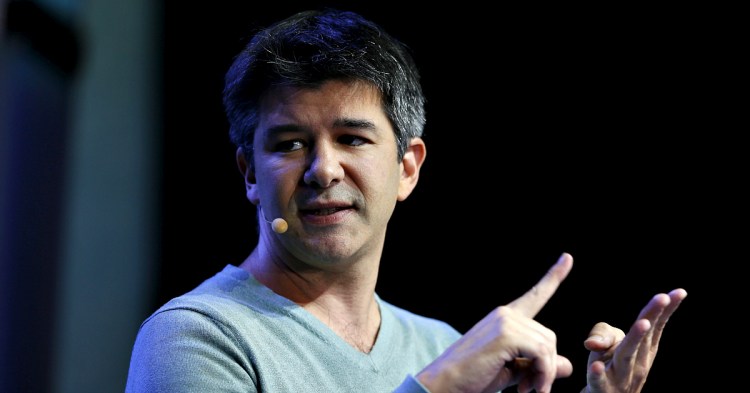Uber, the unorthodox ride-hailing company that shook up the taxi industry, is itself undergoing a shakeup on a seismic scale unprecedented in Silicon Valley, most significantly with the leave of absence for its founder and CEO Travis Kalanick and the departure of a top executive Kalanick had stood by steadfastly through a series of scandals.
Kalanick sent an email to Uber’s staff today saying he will take a leave of absence, according to Bloomberg and Recode. He left open how long his leave will last. The board may also choose to relieve Kalanick of some duties and limit his influence, the reports said.
“The ultimate responsibility, for where we’ve gotten and how we’ve gotten here rests on my shoulders. There is of course much to be proud of but there is much to improve,” Kalanick wrote in his email. “If we are going to work on Uber 2.0, I also need to work on Travis 2.0 to become the leader that this company needs and that you deserve.”
Earlier, Emil Michael, Uber’s senior vice president of business, stepped down and will be replaced by David Richter, who had been the company’s vice president of strategic initiatives, according to an email Michael sent to coworkers obtained by the New York Times.
June 5th: The AI Audit in NYC
Join us next week in NYC to engage with top executive leaders, delving into strategies for auditing AI models to ensure fairness, optimal performance, and ethical compliance across diverse organizations. Secure your attendance for this exclusive invite-only event.
Kalanick’s fate at the company is central to one question that the board hasn’t publicly answered: What kind of company does Uber want to be now? Kalanick’s aggressive, win-at-all-costs managerial style led Uber to expand quickly, reaching a market valuation of $70 billion late last year, but also fostered a corporate culture that its board is belatedly struggling to repair.
Uber’s board of directors voted Sunday to accept all recommendations from former U.S. Attorney General Eric Holder, whose law firm was retained to investigate the company and its workplace culture. Holder’s 12-page report examined the company’s culture following a blog post by a former Uber engineer, Susan Fowler, who detailed her experience with sexual harassment at the company, which she said senior executives blithely overlooked. The first recommendation was to “review and reallocate” Kalanick’s responsibilities inside Uber.
In a statement, Uber confirmed its board unanimously approved all recommendations from the Holder report: “Implementing these recommendations will improve our culture, promote fairness and accountability, and establish processes and systems to ensure the mistakes of the past will not be repeated. While change does not happen overnight, we’re committed to rebuilding trust with our employees, riders and drivers.”
The top-level executive changes follow the firing of more than 20 employees related to sexual harassment and discrimination at the company. Last week, Uber also fired Eric Alexander, who oversaw Uber’s business in Asia, after Recode reported he had obtained medical records of a woman raped by an Uber driver in India. The Holder report looked into other incidents, such as a visit to a South Korean escort bar that prompted complaints to Uber’s human resources department.
The board’s unreserved embrace of the Holder report suggests it now wants a kinder, gentler Uber. But if so, how much of Uber’s trademark aggressive approach will it retain to have an edge in what has become a competitive, well-funded race toward self-driving vehicles? Uber’s success was built on its willingness to break the rules, but now that the consequences of that approach are catching up to it, the company is engaged in the delicate balancing act between preserving the elements of its culture that made Uber a success and throwing out the ones that threaten to cause its implosion.
Much of Uber’s culture to date has come directly from Kalanick, who is said to have resisted some of the report’s recommendations, such as firing Michael, who reportedly played a role in covering up the escort-bar incident and who once suggested Uber would spend a million dollars on opposition research on journalists. If Kalanick does not have a defining voice in determining Uber’s culture, it’s not immediately clear who will. One possibility is Rachel Holt, who heads Uber’s business in the U.S. and Canada.
Uber has lost a number of top executives this year, including its president Jeff Jones, its head of finance Gautam Gupta, its senior vice president of engineering, the head of its AI labs, and Anthony Levandowski, the former Google engineer it brought on to lead its self-driving car efforts. Levandowski was central to a lawsuit that Google’s Waymo unit brought claiming Uber stole its trade secrets.
The changes at Uber may be felt throughout the tech industry and the world of private tech financing. Uber provides a cautionary tale for tech companies that haven’t addressed sexism in their workplaces, and another for investors who give free rein to founders as long as a company is growing.
Tech startups like to spout devil-may-care slogans like “always be hustlin” or “move fast and break things.” But as Kalanick is learning, once some things are broken, you have to also move quickly to fix them. At Uber, that cleanup task now belongs to others.


